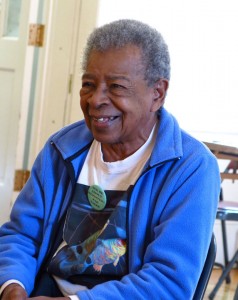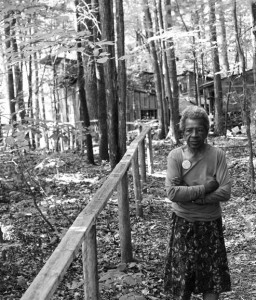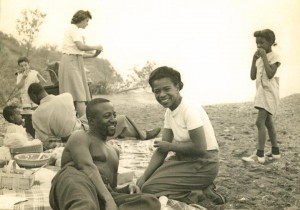 Rest in peace, Juanita Nelson. Pacifist, farmer, civil rights activist, war tax resister, partner of Wally Nelson and co-founder of the Peacemakers group in 1948. Thank you, Juanita, for your shining example to us all in building a better world.
Rest in peace, Juanita Nelson. Pacifist, farmer, civil rights activist, war tax resister, partner of Wally Nelson and co-founder of the Peacemakers group in 1948. Thank you, Juanita, for your shining example to us all in building a better world.
Juanita (Morrow) Nelson, 91, died peacefully following a period of declining health on Monday, March 9, 2015, at Poet’s Seat Health Care Center in Greenfield, Massachusetts.
Heralded as a lifelong activist and pioneer of the Civil Rights Movement and the organic farming and simple living movements, Juanita was born in Cleveland, Ohio, on August 17, 1923, the daughter of Eula Jean (Middlebrooks) Morrow and Oscar Morrow, Sr.
Juanita graduated in 1941 from Cleveland’s Central High School and attended Howard University in Washington, D.C. She served as secretary of the university’s NAACP (National Association for the Advancement of Colored People) and experienced her first arrest for civil disobedience while protesting lunch counter segregation in our nation’s capitol. In 1943, she enrolled in Western Reserve University, majoring in journalism, and worked as a reporter for the Cleveland Call & Post. In that role, she met her lifelong partner, Wally Nelson, while working on a story about segregated conditions in the jail in which Wally was awaiting trial as a conscientious objector.
Juanita worked with CORE (Congress of Racial Equality) on both local and national levels. In 1948, Wally and Juanita refused to pay taxes for war and military preparations and helped found Peacemakers, a pacifist group that took its name from the biblical Beatitudes: “Blessed are the peacemakers….” The group advocated non-payment of federal war taxes, non-registration for the military draft, and the promotion of nonviolence in all areas of life.
In 1950, the Nelsons became part of an integrated household in Cincinnati, Ohio, which led to tensions within a neighborhood where segregation was the norm. In 1955, Juanita earned a degree in speech pathology from Ohio State University, motivated by the fact that this would allow her to work on a contractual basis without withholding taxes.
The Nelsons moved to Philadelphia in 1956 and lived in Powelton Village, a culturally diverse and historic neighborhood. They spent four months at Koinonia Farm in Americus, Georgia, which had come under attack for refusal to discriminate based on skin color. Shots were fired into the community during the Nelsons’ stay. In the late 1960s and early 1970s, Juanita was arrested several times due to activities connected with tax resistance and civil rights protests.
With Wally, Juanita began her farming life in 1970 when they moved to Ojo Caliente in northern New Mexico. Fueled by a desire to live more simply in the face of U.S. war in Vietnam and to be less involved in the economic milieu that spawns war, they made their living by growing and selling produce and attempting to become as self-sufficient as possible. They learned to heat and cook with wood, preserve food, and make their own soap.
Their 1974 move to Woolman Hill, site of a Quaker conference center in Deerfield, MA, brought the Nelsons to the Pioneer Valley, where they became mentors to many people, young and old. Granted lifetime use of a small plot of land, the Nelsons built a compact home with no electricity or running water and received permission from the town to build an outhouse.
Juanita authored many articles and poems, as well as the 1988 book, A Matter of Freedom. She and Wally helped found the Valley Community Land Trust, Pioneer Valley War Tax Resisters, and the Greenfield Farmers’ Market. After Wally’s death in 2002, Juanita hatched the idea for the Free Harvest Supper, held in Greenfield, which has become a major community event in late August of each year.
A longtime advocate of local food, Juanita challenged attendees at the 2006 Free Harvest Supper to eat locally, not just when it was convenient but year round. This challenge spawned Winter Fare, the first winter farmers market in Massachusetts. The idea soon spread throughout the Commonwealth.
For the last several years, Juanita lived with a series of close friends, including Eveline MacDougall, Ellie Kastanopolous, and, most recently, Betsy Corner, Randy Kehler, and Kip Moeller.
Juanita was pre-deceased by her partner Wally Nelson and her brothers Charles Morrow and Oscar Morrow, Jr. She is survived by many nieces, nephews, and cousins in Ohio, and by a large national and international family of friends and fellow travelers. She will be sorely missed by many.
End-of-life arrangements are being handled by the Eternal Blessings Cremation Service in Guilford, Vermont.
Memorial donations may be sent to the Valley Community Land Trust, Box 1552, Greenfield, MA 01302, and to the Wally and Juanita Nelson Scholarship Fund at Greenfield Community College, c/o GCC Foundation, 270 Main Street, Greenfield, MA 01301.
There will be a gathering to celebrate Juanita’s life later this Spring, at a place and time to be announced.
xxx
Juanita Nelson, at 91; civil rights activist advocated local food
At 16, Juanita Nelson boarded a train with her mother to travel from their Cleveland home to visit relatives in Georgia. While changing trains in Cincinnati they were assigned segregated seating.
When the African-American teenager asked if they could switch from what she called their “Jim Crow” car to one that seated white passengers, her mother said, “Oh, Nita, I’m just too tired,” Ms. Nelson recalled in an oral history interview recorded by the Memorial Hall Museum in Deerfield. “I sat and fumed,” Ms. Nelson continued, “and finally I got up and sat in every car in that train because I was so upset.”
No one tried to dissuade Ms. Nelson as she moved from car to car, except for a black porter who warned that she might get into trouble. She said she “went back and sat by my mother and I felt better because I had expressed myself.”
Racial equality was important to Ms. Nelson, who became a civil rights activist, but in later years “it became her conviction that we have to get over race,” said her friend Randy Kehler of Colrain. “She believed much more in the idea that we’re all human. That was her mantra.”
Ms. Nelson, a strong voice in the tax resistance and local agriculture movements, died of end-stage dementia March 9 in the Poet’s Seat Health Care Center in Greenfield. She was 91 and had lived for more than 40 years in Deerfield and Greenfield.
Through actions more than words, friends said, she demonstrated her beliefs by refusing to pay federal taxes and by growing and selling her own food, a skill she perfected and passed along to friends and neighbors. Those activities often go hand-in-hand because tax resistance generally requires a low income and self-sufficiency.
“She had a very sharp and able mind that never tired,” said Ellie Kastanopolous of the nonprofit Equity Trust in Amherst, which promotes sustainable approaches to property ownership. “You could talk to her about anything; she was incredibly wide open.”
Ms. Nelson believed that “in this crazy economic world we’re in, everyone has to figure out how to live with less,” Kastanopolous said. “She would hold you to the fire, but she would do it in a thoughtful and caring way that was very powerful.”
Ms. Nelson was arrested numerous times over the course of her life at civil rights and tax resistance protests.
“She really believed that all people were equal and should be treated equally,” said Bob Bady of Brattleboro, a tax resister who was 18 when he met Ms. Nelson and her partner, Wallace Nelson.
“What impressed me about Juanita was her accessibility, particularly because I was so young and searching for meaning,” he said. “They were people who’d integrated their philosophy into their lifestyle. And she was really easy to talk to and to get to know.”
Friends said Ms. Nelson and her partner, who was known as Wally, never married. In the past, the Globe referred to them as spouses, including in his 2002 obituary. Both were vocal opponents of war. Refusing to pay taxes, Ms. Nelson said in the oral history, is “the only way you can stop war . . . and stop so much consumption that requires war, at least that’s the way I look at it.”
Kehler, who was jailed for refusing to cooperate with the draft during the Vietnam War, described Ms. Nelson as “firm and tough-minded in her convictions.” He added that she was “as gracious and welcoming as could be.”
Kehler and his wife arranged for the Nelsons to settle on a half-acre of land at Woolman Hill in Deerfield, a retreat center owned by the Quakers, the Religious Society of Friends. The Nelsons built a small house with neither electricity nor indoor plumbing, and also planted and harvested in earnest, teaching neighbors to do the same. According to the center’s website, Ms. Nelson lived there until 2012.
Although the Nelsons were not Quakers, “some of our best friends are Friends,” she told the Globe in 1985. The Globe reported that on an Internal Revenue Service tax return that year, she wrote phrases including: “I do not wish to work one day each week for the Pentagon — there is better employment.”
Ms. Nelson submitted similar forms to the IRS each week at the beginning of 1985. The government considered the returns frivolous, and fined her and other protesters $500 for each one sent. “I have no idea how hard they’ll press us for the money,” she said, speaking on behalf of the group, “but so far, we haven’t been paid a personal visit by the IRS.”
Juanita Morrow was born in Cleveland and grew up in what she called the city’s “outer slums.” In the oral history, she said she won a poetry contest at 17 and used the money to buy her family’s first telephone.
After graduating from high school, she enrolled in Howard University, where she became secretary of the school’s NAACP chapter. She also was involved with the Congress of Racial Equality.
Transferring to what is now Case Western Reserve University in Cleveland, she graduated with a bachelor’s degree in journalism. While working as a reporter for a Cleveland newspaper, she interviewed Wally Nelson, who was serving a jail sentence.
After registering as a conscientious objector during World War II, he and some friends walked away from their civilian public service camp to work with the poor in Detroit, until they were arrested.
In 1948, the Nelsons helped form the pacifist group Peacemakers. Ms. Nelson graduated from Ohio State University in 1955 with a master’s in speech pathology. In the years that followed, the couple lived in Philadelphia, Americus, Ga., and Ojo Caliente, N.M., where they began supporting themselves through growing and selling food.
Moving to Deerfield in 1974, they grew beans and other produce and sold the surplus at a farmers’ market. They also made their own soap and ceramic dishes.
Ms. Nelson also wrote poetry and articles for magazines, and one poem captured the challenges of the life she chose:
Well, I try to grow my own food, competing with the bugs,
I even make my own soap and my own ceramic mugs.
I figure that the less I buy, the less I compromise
With Standard Oil and ITT and those other gouging guys.
Oh, but it ain’t easy to leave my cozy bed
To make it with my flashlight to that air conditioned shed
But then I get to thinkin’, if we’re ever gonna see
the end of that old con game, the change has got to start with me.
A service will be announced for Ms. Nelson, who leaves no immediate family.
Friends said she was very social, combining work and conversation when possible.
“She loved being a mentor to other people, especially young folks,” Kehler said. “She loved meeting new people and loved having visitors. But when people came over, Juanita would always say, ‘Let’s talk while we hoe.’ And she would.”

